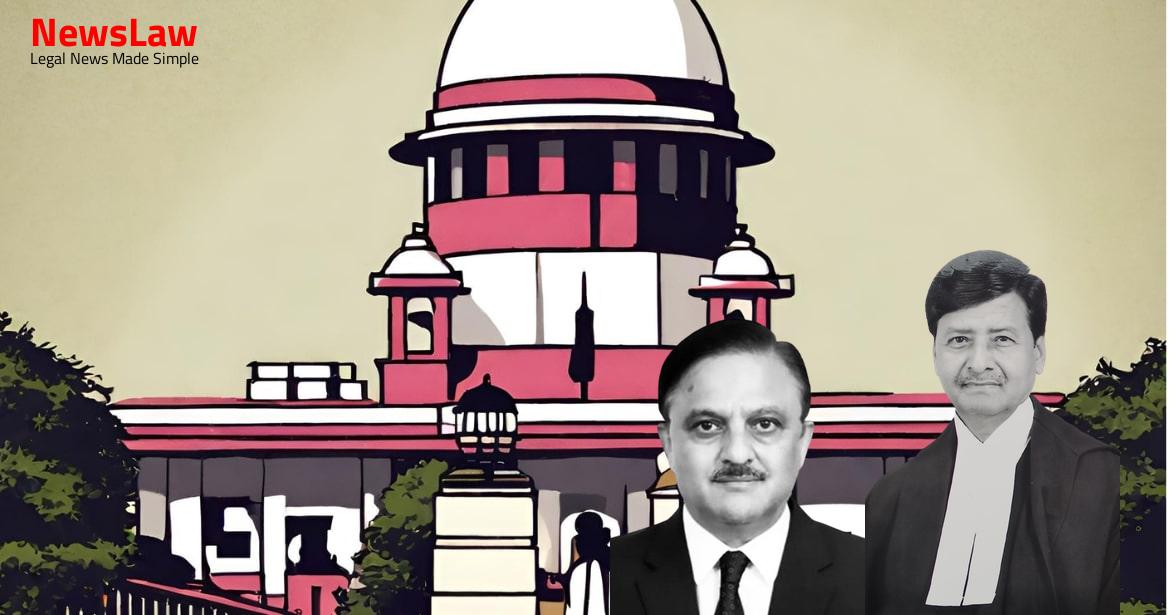The legal case delves into the delegation of powers in the real estate regulation sector, focusing on the court’s analysis of the authority’s jurisdiction and the permissible delegation of judicial functions. The scrutiny of these aspects provides crucial insights into ensuring effective regulatory oversight and protection of stakeholder rights in the real estate industry. Stay tuned to unravel the intricate legal nuances of the case.
Facts
- Promoters/real estate developers filed appeals against certain provisions of The Real Estate(Regulation and Development) Act, 2016, The Uttar Pradesh Real Estate(Regulation and Development) Rules, 2016, and the functioning of the Uttar Pradesh Real Estate Regulatory Authority.
- Allottees/home buyers invested in properties but did not receive possession as per agreements, leading to complaints and requests for refunds with interest.
- Orders were passed by a single member of the authority directing refund of principal amount with interest (MCLR + 1%) as prescribed by the State Government under the Act.
- Private players entered the real estate sector to meet the rising demand for housing as government schemes were insufficient to cope with the demand.
- Real estate sector was largely unregulated before the Act, leading to lack of consumer information and accountability towards builders and developers.
- Statement of object and reasons of the Act focused on regulating the real estate sector and ensuring compliance with obligations of promoters.
- Promoters/real estate developers challenged the authority’s orders in the High Court, questioning jurisdiction and pre-deposit conditions for appeals.
- Appeals were filed in the High Court by promoters/real estate developers after their writ petitions were dismissed, highlighting inadequacy of The Consumer Protection Act, 1986 in addressing the needs of home buyers and promoters.
- Demand for housing increased significantly due to population growth and urbanization, necessitating the need for the Real Estate(Regulation) Bill to establish oversight and enforcement mechanisms in the sector.
Also Read: Recovery of Misappropriated Temple Funds: Court’s Legal Analysis
Issue
- The Act 2016 is not retrospective in its operation.
- The Act 2016 is not retroactive in its operation.
- The legal consequence of this is that the Act 2016 will apply only prospectively and not affect past events or transactions.
Also Read: Legal Analysis in Assault and Homicide Case
Arguments
- The single member of the authority’s order is without jurisdiction and coram non-judice.
- Regulation 24(a) of the Regulations 2019 is in contravention of the parent statute as delegation of power to a single member of the authority for Sections 12, 14, 18, and 19 is not contemplated.
- The legislative intent of the Act is to regulate the real estate sector, including ongoing projects, to protect stakeholder rights.
- The Act applies retrospectively to ongoing projects, even those with agreements before the Act came into force.
- The authority’s role is quasi-judicial, and powers should be exercised by the competent authority unless expressly permitted by law.
- Delegation of judicial power to a single member of the authority is not allowed under the Act.
- The return of amount provision in Section 18(1) is an allottee’s right and not dependent on the promoter’s justifications.
- The power vested with the authority cannot be delegated to a single member under Section 81.
- The Act distinguishes between new and existing projects, and ongoing projects are covered under the Act.
- The authority’s power to adjudicate complaints under Sections 12, 14, 18, and 19 is quasi-judicial and cannot be delegated to a single member.
- The Act’s provisions operate based on earlier actions but do not delegate other functions of the authority to a single member.
- The authority’s power under Sections 12, 14, 18, and 19 is similar to a judicial function and cannot be delegated without express authority.
- Delegation of core judicial functions to a single member of the authority is impermissible.
- Powers to decide complaints under Section 31 are quasi-judicial and can be delegated if provided for in the statute.
- The authority intentionally did not delegate several other powers to a single member.
- Special orders have authorized a single member to hear refund matters under Section 31.
- The authority is best equipped to determine delays in projects and handle refund claims effectively.
- The intent of the Act hinges on whether a project received a completion certificate at the Act’s commencement.
- Refund claims can be efficiently dealt with by the authority, with interest on refunds as prescribed by the Government.
- The single member of the authority is empowered to hear complaints under Section 31 for speedy disposal.
- Learned counsel for the respondents argues that the complaint of the appellants is primarily about the competence of a single member to hear complaints under Section 31 of the Act and the delegation of power by the authority using Section 81.
- The counsel further argues that similar delegation of power provisions exist in other statutes like the SEBI Act, where Section 29-A allows delegation and Section 19 empowers the board to delegate to any member.
- The case of Saurashtra Kutch Stock Exchange Ltd. Vs. Securities and Exchange Board of India has been cited to support the argument regarding delegation of powers.
Also Read: Legal Analysis on Invalid Sale Deeds and Power of Attorney
Analysis
- The analysis section of the judgment delves into the delegation of powers, adjudicatory functions, and procedural aspects under the Uttar Pradesh Real Estate (Regulation and Development) Act, 2016.
- It scrutinizes the sections dealing with complaints, compensation, interest, and refund of amounts under the Act, highlighting the distinct nature of these remedies and the authorities responsible for adjudication.
- The Act provides a detailed framework for registration of real estate projects, obligations of promoters, and rights of allottees/home buyers, emphasizing on the obligation to refund amounts and adjudicate compensation within defined timelines.
- The analysis clarifies the jurisdiction of the regulatory authority and the adjudicating officer, emphasizing that the delegation of powers is permissible and in line with the legislative intent under the Act.
- It discusses the significance of delineating powers between the regulatory authority and the adjudicating officer, ensuring prompt disposal of complaints and adherence to the statutory provisions.
- The retrospective application of the Act, implications on ongoing projects, and the rights of allottees and promoters are examined to safeguard consumer interests and promote accountability in the real estate sector.
- The analysis also highlights the provisions related to recovery certificates, pre-deposit conditions for appeals, and the distinction between refund of amounts and compensation.
- Overall, the analysis elucidates the legislative intent, procedural mechanisms, and judicial interpretation of the Act to ensure effective consumer protection and regulatory oversight in the real estate industry.
- Sections 18 and 19 of the Act provide remedies for allottees in case of non-compliance by the promoter.
- Allottees have the unconditional right to seek a refund if the promoter fails to deliver possession.
- The Act allows filing of complaints with the Authority or the adjudicating officer for violations.
- Section 71 outlines the power of the adjudicating officer in adjudging compensation under specified sections.
- The Act empowers the Authority to delegate powers to its members except for the power to make regulations.
- The Act differentiates between ongoing projects and completed projects for regulatory purposes.
- The Act provides specific rights to allottees in case of structural defects or delayed possession.
- Penalties and adjudication procedures are detailed in the Act for compliance and enforcement.
- The Act contains provisions for appeals to the Appellate Tribunal with pre-deposit conditions.
- The legislation aims to protect the interests of both allottees and promoters in the real estate sector.
- Arbitrariness violates Article 14 of the Constitution as per the Maneka Gandhi case.
- The principles of not being remediless have been consistently upheld in various cases like Bombay Municipal Corporation Vs. Dhondu Narayan Chowdhary.
- The Act provides conditions for the refund of deposited amounts with interest, leaving no discretion to the authority.
- Section 18 of the Act gives the allottee the right to a refund of the deposited amount with prescribed interest if the promoter fails to deliver the property on time.
- The Consumer Protection Act also imposes conditions for pre-deposit to avoid frivolous appeals.
- The distinction between retrospective and retroactive laws has been clarified.
- The power to decide revisions can be delegated by the Board to the Director as seen in the case of Heinz India Private Limited.
- The High Court upheld the delegation of power by the Full-Time Member of SEBI regarding recognition withdrawal.
- Delegation of power under the SEBI Act is similar to Section 81 of the Act 2016.
- The second proviso to Section 19 of the Act mandates pre-deposit for an appeal before the National Commission.
- Retroactivity and retroactive statutes have been defined with reference to various case laws.
- The judgment in Vineeta Sharma Vs. Rakesh Sharma discussed the scope of retroactive statutes under the Hindu Succession Act, 1956.
- Section 40(1) of the Act should be interpreted in a way that aligns with the purpose of the Act.
- The amount to be refunded to allottees/home buyers, as determined by the authority or adjudicating officer, is recoverable as arrears of land revenue under Section 40(1) of the Act.
- Harmonizing the provisions of the Act ensures that the intention of the legislature is upheld and that the Act functions as intended.
- The judgment in the appeals under scrutiny is deemed to be correct with no errors found.
Decision
- Appellants are given the option to appeal before the Appellate Tribunal within 30 days
- Appellants must comply with the pre-deposit condition as per Section 43(5) of the Act
- Tribunal will decide on the pre-deposit based on its merits and in accordance with the law
- No costs involved in the appeal process
Case Title: M/S NEWTECH PROMOTERS AND DEVELOPERS PVT LTD. Vs. THE STATE OF UTTAR PRADESH (2021 INSC 716)
Case Number: C.A. No.-006745-006749 / 2021



